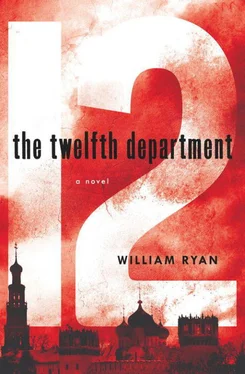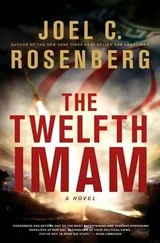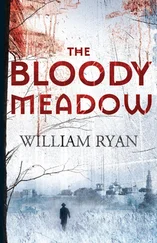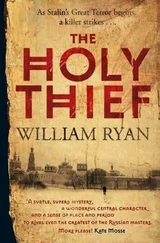He turned back to the receptionist—a fat head above a frock coat with a cravat to round it off, no less. He appeared to be trying to look down his nose at Korolev but, as Korolev was a good six inches taller than him, he was failing. All the same, his nose looked like it was planning to recoil back into that plump face in horror at the fact that an honest cop like Korolev should wander in unannounced. Korolev was about to become annoyed when he remembered what his face must look like. He shrugged inwardly. The fellow probably had a point.
“I’m here to talk to Madame Shtange, Comrade. She’s staying here—and I’m expected.”
“Madame Shtange is a Soviet citizen?” The question was as carefully delivered as a ballet dancer’s pirouette. But the meaning was clear enough—if she’s a foreigner, you can go whistle, flatfoot—she’s State Security’s business.
Korolev put his elbows on the counter and yawned, then looked at the receptionist with genial menace, pleased to see his reaction change from puzzlement to concern. Korolev let him sweat for a moment or two before he spoke.
“She’s a Soviet resident,” Korolev said. “A Soviet resident that this Soviet Militiaman wants to talk to. Now, how about you do your duty to the Soviet State and tell her I’m here to speak to her? As I said, she’s expecting me. And be quick about it—the consequences for you if you don’t cooperate fully won’t be pleasant, believe me.”
The receptionist blinked twice and then his demeanor was transformed smoothly to one of ingratiation.
“Of course, Comrade Captain, it would be my pleasure. I always do my duty to the State, of that you can be completely and absolutely certain. Let me see which room she’s in.”
Korolev smiled grimly, thinking there were certain advantages to his temporary assignment. The receptionist pulled out a long drawer that was built into the reception desk and let his fingers flicker along the filing cards it contained. The only problem, Korolev thought to himself, was that being able to push citizens round like this would probably make scoundrels out of most men before a week was out.
“Here we are—seven seventeen.” He turned to look at the wall behind him—hundreds of keys were stored in regular rows along with messages and post. The concierge went to the box numbered 717, extracted a piece of paper and opened it.
“Ah—my apologies, Comrade Captain. You are indeed expected. Madame Shtange is waiting for you in the roof-terrace cafe.”
“The roof-terrace cafe? That would be on the roof?”
The receptionist smiled, as if Korolev had made an amusing joke.
“Of course. Where else?”
“How many stories up would that be? This roof?”
Korolev could hear the disgruntlement in his voice. It was there for a reason.
“Twelve?” The fellow looked uncertain now.
“Twelve,” Korolev said, and felt like battering his head against the smooth surface of the reception desk. Not two hours before he’d sworn he’d never venture on to the top of another tall building, and yet here he was, being forced to do it again almost straightaway.
“Shall I ask someone to show you up?”
“Thank you.” Korolev sighed.
The receptionist seemed to remember something suddenly. He looked at him quizzically, then reached for a notebook.
“Captain Korolev, wasn’t it?”
“Yes.”
“Yes, there’s a message for you as well.” He went to an unmarked box underneath the rows of keys and extracted a small piece of paper, handing it over.
It said “Captain A. D. Korolev. Call Petrovka.”
Korolev turned it over, just in case, but there was nothing else to be read. It must be about Yuri, surely. He felt his knees begin to shake unaccountably. He wasn’t sure if it was from fear or anticipation.
“Can you let me use a telephone?”
“Here,” the receptionist said, placing one on the counter.
“It’s Korolev here,” he said when he got through.
“Yes, Comrade Captain,” a woman’s tinny voice said. “Captain Yasimov called. He told me to tell you your son was seen catching a train toward Moscow, one station further along the track. At around ten o’clock. He was with two other boys. Captain Yasimov moved his inquiries to Moscow now. And First Inspector Popov has asked all detectives to keep a look out for your son as well.”
There was a cough and then the voice continued.
“We all hope he will be found soon.”
Korolev didn’t say anything for a moment—if Yuri was heading for Moscow then he’d be heading for the apartment, which was good. But who were these two other boys? And Moscow was a damned big place—finding him, if he didn’t go to Bolshoi Nikolo-Vorobinsky, would be hard.
“Thank you,” he said. “I’m grateful for your concern. I’ll call in again in an hour or so, and please pass my thanks to everyone—the chief in particular. And tell Yasimov I owe him.”
* * *
Korolev hung up and handed the telephone back to the receptionist. It was good news, he was sure of it. Yuri would be home before him, with a bit of luck, and they could forget this whole mess had ever happened.
“I’ll go up to this roof of yours, then,” he said.
A young lad in a uniform with a round tasselled cap appeared at the click of the receptionist’s fingers and directed Korolev toward the lifts. Korolev looked toward the stairs but the Lord knew how many steps there might be, and he was tired enough as it was. So he did his best to relax as the lift climbed higher and higher. He only realized he’d been holding his breath the whole way when they finally reached the top.
“Here we are,” the youngster said, as proud of the colonnaded roof terrace as if he owned it. And the truth was—it wasn’t too bad. The best thing about it was that it had a fine parapet about four feet high between a fellow and a plunge to the ground below. And not only that, on top of the parapet, between the columns that stretched the length of the building, there was another two feet of solid-looking glass. Korolev congratulated the hotel’s architect from the bottom of his heart.
“Madame Shtange?” he asked when he was led to a corner table where a blond woman of about thirty sat, a cup of coffee in front of her and a lean, hungry-looking fellow who reminded Korolev of a greyhound sitting opposite. For a moment he was torn between the view—which was extraordinary, overlooking the Lenin Library, the Kremlin Arsenal, and the southern half of Moscow—and the woman, who was equally extraordinary, fine-featured yet, it seemed to him, strong, determined, and damned attractive to boot.
“Captain Korolev,” she said, examining the identity card he offered her and then stubbing her cigarette into an ashtray that was already half-full. Her accent was foreign, but not too foreign. Meanwhile the greyhound had lifted himself languidly from his seat and was offering his hand.
“This is Monsieur Hubert, from the French embassy,” Madame Shtange said.
“I see,” Korolev said, wishing Dubinkin was here. He shook the fellow’s hand anyway. What else was he supposed to do?
“Madame Shtange’s a French citizen, Comrade Captain,” the greyhound said. “She’s under the personal protection of our ambassador. Her uncle, you should be aware, is a minister in the current government—a government that is friendly toward the Soviet Union. For the moment, at least.”
Hubert spoke slowly, with a sympathetic expression that Korolev decided shouldn’t be taken at face value.
“The French Government?”
“Yes.”
“And a minister, you say.” Korolev managed to restrain his instinctive desire to groan. Dubinkin had promised he’d be here in the next half an hour but he couldn’t very well wait till then to start asking questions. “May I sit down?”
Читать дальше












